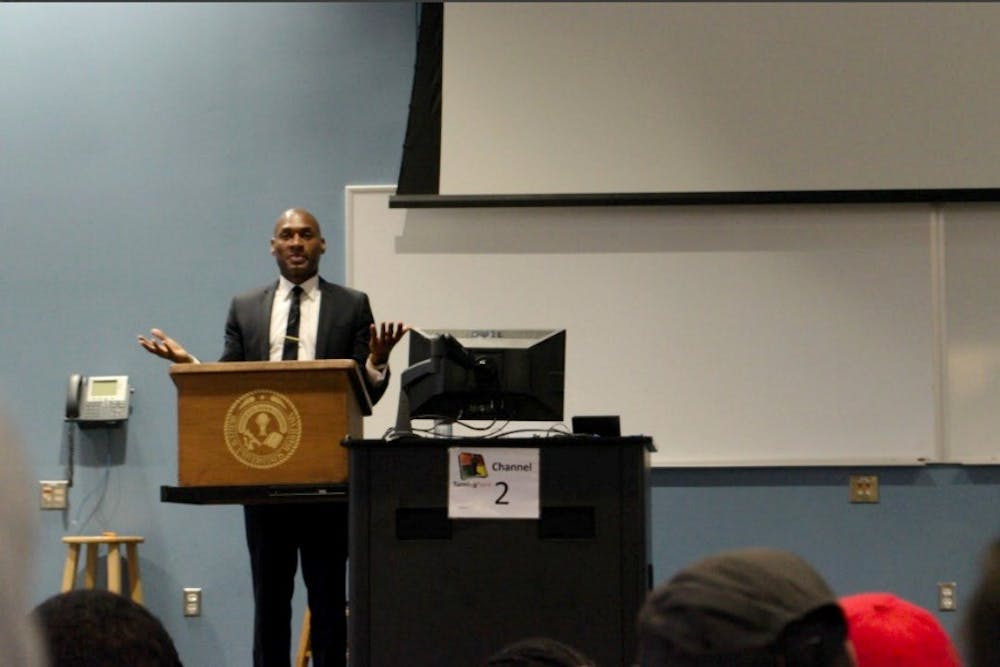By Bonnie Meibers, Senior Staff Writer
Discussion of the #BlackLivesMatter movement returned to Miami's campus when Charles Blow, op-ed columnist for The New York Times and CNN contributor, spoke on Monday, Apill 11 to a full auditorium in Benton Hall.
"Charles M. Blow is one of the leading journalists of our day," said Jana Braziel, chair of the global and intercultural studies department. "He writes with a fierce passion and moral courage."
Blow joined The New York Times in 1994 as a graphics editor and quickly worked his way up to graphics director, in which capacity he led the Times' award-winning graphic coverage of 9/11. Blow's op-ed column, which has been published twice a week since 2008, addresses race, gay rights, politics and other controversial issues.
The #BlackLivesMatter movement was founded in 2013 by Alicia Garza, Patrisse Cullors and Opal Tometi after police officer George Zimmerman, was acquitted for shooting and killing an unarmed black teenager, Trayvon Martin.
However, Blow said that the movement started much earlier than that-60 years ago, with the murder of Emmett Till. The 14-year-old boy was murdered for allegedly flirting with a white woman. Till's murderers were acquitted after only 67 minutes of deliberation.
Blow drew comparisons between the civil rights and Black Lives Matter movements, but said that they differ in that the civil rights movement was rooted in religion.
"This movement doesn't have religion as its primary force, but it is nonetheless rooted in the morality of man," Blow said.
The #BlackLivesMatter movement, though, is allowing for a civic awakening and new discussions on race and civil rights, he said. Blow also denounced institutional racism.
"I refuse to allow my biting self-determinism to blind me to systems designed and built on devaluation and destruction," he said. "I know, as others do, the frustration and fatigue of swimming against the current."
Blow also touched on the presence of implicit bias in America. He used characters in children's books as an example of this bias. White characters are often depicted as astronauts or chefs or presidents, and black characters in children's books are almost always learning how to cope with their skin color, their hair and their different-ness.
"What psychic damage does it do to the black mind when one must come to fear to the black body?" Blow said.
The lecture was followed by a question-and-answer session. The first person asked whether or not Blow believed attacks on white people, like the attacks in Paris and Brussels, deserve less attention than attacks on black people.
Blow began to answer, but the asker of the question interrupted him.
"So you're saying white people dying deserve less sympathy because they're not black?"
Blow was quiet for a moment, staring at his heckler.
"Every time there is a terrorist attack, our response should be the same if there is no ethnocentric sensibility to what our sympathies are," Blow said. "Next!"
Another audience member asked if the #BlackLivesMatter movement is saying that not all lives matter.
"I believe this: all lives should matter equally, but until this country recognizes that fact it is not only appropriate, but it is necessary to point out the lives that it tends to value less," Blow responded.
First-year Bridget Larock said she found the lecture eye-opening.
"[Blow] was able to explain the purpose of the movement well," she said.
The lecture addressed daily inequality and racism black Americans suffer today.
"The most important thing that I took away from the lecture is that I, too, am not free of blame," junior Christy Torrese said. "It is our problem."
Blow's lecture was a call to action for many, like Torrese, to unite as one group regardless of race. Blow asked the audience to do something about the inequalities that they know exist.
"None of our hands," he said, "are clean."

